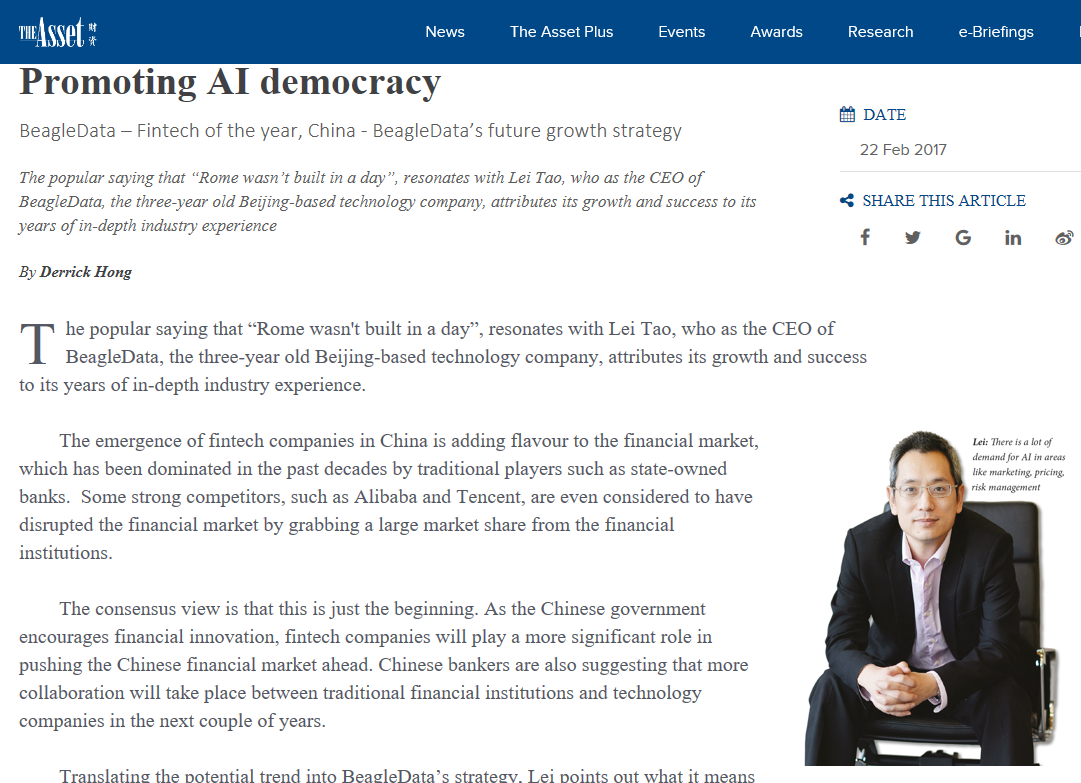Triple A Digital Awards由香港《财资》杂志主办,旨在发现亚洲区内持续利用科技提升银行程序素质的Fintech 企业,及对亚太地区数位化的创新和改善做出杰出贡献的金融机构。天云大数据作为大陆地区入选企业,与日本Alpaca公司、新加坡Fundnel公司、菲律宾Lendr公司共同入围本次奖项。
如下是香港财资杂志对天云大数据CEO雷涛的英文专访:
BeagleData – Fintech of the year, China – BeagleData’s future growth strategy The popular saying that “Rome wasn’t built in a day”, resonates with Lei Tao, who as the CEO of BeagleData, the three-year old Beijing-based technology company, attributes its growth and success to its years of in-depth industry experienceBy Derrick Hong
The popular saying that “Rome wasn’t built in a day”, resonates with Lei Tao, who as the CEO of BeagleData, the three-year old Beijing-based technology company, attributes its growth and success to its years of in-depth industry experience.
The emergence of fintech companies in China is adding flavour to the financial market, which has been dominated in the past decades by traditional players such as state-owned banks. Some strong competitors, such as Alibaba and Tencent, are even considered to have disrupted the financial market by grabbing a large market share from the financial institutions.
The consensus view is that this is just the beginning. As the Chinese government encourages financial innovation, fintech companies will play a more significant role in pushing the Chinese financial market ahead. Chinese bankers are also suggesting that more collaboration will take place between traditional financial institutions and technology companies in the next couple of years.
Translating the potential trend into BeagleData’s strategy, Lei points out what it means for the company: “we will promote ‘AI democracy’ as our future strategy. We used to sell IT infrastructure capabilities and data science engineering capabilities. But now as more AI platforms are being released, we can replicate and sell more AI models, such as credit scoring and fault detection models, to more banks”.Given its stable and comprehensive big data platform, BeagleData is attracting growing interest from financial institutions. China Everbright Bank, one of the largest joint-stock commercial banks in China, has been using the service from BeagleData since 2013. Based on the open-source software framework Hadoop, BDP (BeagleData Platform) 2.0 enables the bank to better manage its data, and offer timelier data searching services to its customers.
The popular saying that “Rome wasn’t built in a day”, resonates with Lei Tao, who as the CEO of BeagleData, the three-year old Beijing-based technology company, attributes its growth and success to its years of in-depth industry experienceBy Derrick Hong
The popular saying that “Rome wasn’t built in a day”, resonates with Lei Tao, who as the CEO of BeagleData, the three-year old Beijing-based technology company, attributes its growth and success to its years of in-depth industry experience.
The emergence of fintech companies in China is adding flavour to the financial market, which has been dominated in the past decades by traditional players such as state-owned banks. Some strong competitors, such as Alibaba and Tencent, are even considered to have disrupted the financial market by grabbing a large market share from the financial institutions.
The consensus view is that this is just the beginning. As the Chinese government encourages financial innovation, fintech companies will play a more significant role in pushing the Chinese financial market ahead. Chinese bankers are also suggesting that more collaboration will take place between traditional financial institutions and technology companies in the next couple of years.
Translating the potential trend into BeagleData’s strategy, Lei points out what it means for the company: “we will promote ‘AI democracy’ as our future strategy. We used to sell IT infrastructure capabilities and data science engineering capabilities. But now as more AI platforms are being released, we can replicate and sell more AI models, such as credit scoring and fault detection models, to more banks”.Given its stable and comprehensive big data platform, BeagleData is attracting growing interest from financial institutions. China Everbright Bank, one of the largest joint-stock commercial banks in China, has been using the service from BeagleData since 2013. Based on the open-source software framework Hadoop, BDP (BeagleData Platform) 2.0 enables the bank to better manage its data, and offer timelier data searching services to its customers.
Apart from the big data platform, the other main project that the company is actively promoting is its MaximAI, an artificial intelligence (AI) project which allows engineers from financial institutions a free coding platform where different languages are available and recognizable. “So in 2017, we will focus on how AI can help us to solve more problems and how to get more involved in the wave of fintech,” says Lei.
“In other words, our clients no longer need a data science PHD to do the job, a masters-level or even a bachelor student with less experience can bring their learning into practice in minutes”.
Challenge and opportunity
In a bid to boost the development of big data, the Chinese state council issued its 50th policy in 2015, which includes a series of initiatives to educate market participants on how to use big data. On top of the financial industry, other sectors such as transportation, health care, and environmental sectors, will be allowed to adopt big data to improve efficiency. Currently, the usage of big data as well as AI is still at an early stage, due to a lack of market awareness, according to Lei.

Data from iResearch shows that by 2020, the Chinese AI market will grow to 9.1 billion yuan with a compound annual growth rate of 50%. Rapid growth coupled with underdeveloped business environments creates opportunities for technology enablers like BeagleData. However, it also poses a challenge to decision-makers as they may need to pick the best from a number of feasible options.
“There is a lot of demand for AI in all areas such as marketing, pricing, risk management, and fault detection. Each product and business line needs AI,” says Lei. Yet, the ecosystem is yet to be sophisticated in China, and it will require a lot of companies to participate. “It is not possible for one vendor to complete the system. In North America, it is just the same. Technology enablers have high valuations, but if you look at their size, they are just at the starting point”.
Unlike many fintech companies that seek as many clients as possible, BeagleData is more willing to work with more open-minded and quality business partners. In the Chinese banking industry, for instance, privately owned banks are its favoured clients due to their willingness to accept and adopt new concepts. Currently, the client base of BeagleData has already expanded to 13 large corporations or institutions, including State Administration of Grain, Taikang Life, and China Mobile.
In Lei’s view, the growth of the company is more about reconstruction and reorganization. “Through that process, top resources are better allocated under a corporate structure,” says Lei, “We signed a contract to build a mission-critical online transaction system with a large joint stock commercial bank on the first day of our company. Obviously, it is a result of our accumulation in resources, employees, and capital prior to that”. 2019年11月4日
2019年11月4日



